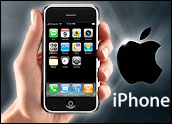
With its sex appeal, direct conduit to YouTube and ability to store videos and music — advantages hardly conducive to productivity in a work environment — it would not seem likely that many businesses would want to incorporate the iPhone into their operations.
Then there is the not small matter of security; the latest news is that a bona fide vulnerability has been discovered in the iPhone’s Safari Web browser that could allow hackers to hijack the device and empty it of its content. Say what you will about the BlackBerry’s complexity — that device is secure.
However, both businesses and vendors alike appear to be cautiously exploring the possibility of deploying the iPhone as a business tool. CRM (customer relationship management) is one of the likely business applications for the device for a variety of reasons that are unrelated to its cool factor. Or so advocates say.
Customer Demand?
“To be able to easily use mobile Google Maps from one ACT! contact to another or to quickly check your Lotus Notes meeting schedule demonstrates the business value of the iPhone device,” said Wayland Bruns, CEO ofCompanionLink Software, a provider of mobile synchronization applications. “The iPhone is a leap in value over every prior handheld and shows that new technology can dramatically improve personal productivity while saving time and effort.”
Many of the company’s customers have already inquired about adapting CRM software to the iPhone, Rushang Shah, a director at CompanionLink, told CRM Buyer.
An app specifically designed for the iPhone would address CRM’s main pain point in the mobile environment: clumsy synchronization, said Rob Walch, host of the “Today in iPhone” podcast.
“I think with the iPhone the whole issue of sync becomes a moot point,” Walch told CRM Buyer. “The iPhone allows you to do a Web-enabled service. There is no need to sync if you can always get into the intranet.”
The Roster
The list of vendors offering mobile CRM tailored to the iPhone is still short. NetSuite has just introduced native support for the iPhone and the Safari browser in SuitePhone, which is compatible with its own product line and its role-based dashboards. With SuitePhone, iPhone users can remotely access invoicing, accounts receivable and payroll. They can also enter leads, file expense reports, view contacts, and even place quotes and orders. E-commerce operations can also be managed through the device.
CompanionLink has released iPhone synchronization for ACT! by Sage, GoldMine, Lotus Notes, Novell GroupWise, Time & Chaos, Google Apps and Palm Desktop.
Then there isEtelos, which provides open source Web 2.0 applications on a hosting environment. Its recently introduced CRM for iPhone provides contact, task, group, sales and project management, as well as group messaging and reporting functionality, in one interface compatible with the iPhone’s Safari Web browser.
“It allows you to get access to your tasks, projects, appointments or any of your other business processes while you’re away from the office,” said Etelos CTO Danny Kolke. More than 4,000 businesses have signed up for the existing versions of Etelos CRM, according to the company.
The Case Against
Not everyone is as enamored with the iPhone device — at least as a smartphone for business applications. The iPhone is not a good platform for CRM, D.P. Venkatesh, founder ofmPortal, a company that develops mobile content delivery and discovery software, told CRM Buyer.
It isn’t likely that Apple thinks it is, either, he observed. “Look at the way it has been launched — it is largely seen as a consumer product.”
Many security-conscious enterprises are very nervous about the possibility that the devices could breach their carefully constructed IT perimeters. “No one wants to let in a device over which they have no control,” remarked Venkatesh.
What’s more to the point, in the case of a CRM application, is that the iPhone could become the repository of sensitive sales data, competitive business information about product lines and personal information about customers — none of which should be allowed to get out into the wild.
Of all the smartphone handsets in circulation now, the iPhone is probably the most vulnerable, given its novelty and the fact that hackers around the world are vying to win accolades for being among the first to penetrate the gadget’s security.
Still, the specter of an iPhone Safari flaw exposing consumer data or disabling security processes surrounding sensitive corporate databases is not keeping Venkatesh awake at night.
“We won’t be seeing that much use of the iPhone in business — at least, not for a while,” he predicted. “The phones are (US)$500, and I don’t think there are that many companies willing to spend that amount.”





















































